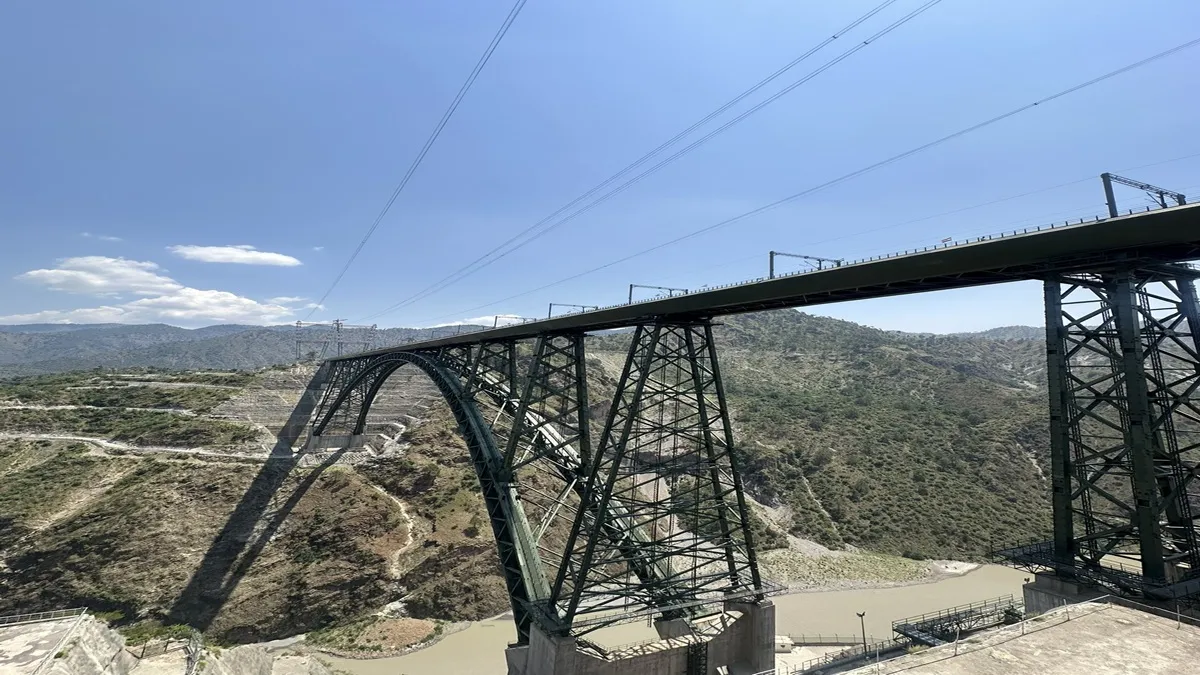Prime Minister Narendra Modi is set to visit Jammu and Kashmir on Friday (June 6), where he will inaugurate the world’s highest railway arch bridge over the Chenab River and launch a series of major infrastructure and connectivity projects across the Union Territory. One of the major highlights of the visit will be the inauguration of the 'Chenab Rail Bridge', the highest railway arch bridge in the world.
Chenab Railway Bridge: A global engineering marvel
Perched 359 metres above the Chenab River, this 1,315-metre-long steel arch structure has been designed to withstand extreme seismic activity and high wind speeds. Once operational, it will dramatically reduce the travel time between Katra and Srinagar via the Vande Bharat Express, bringing the journey down to approximately 3 hours, cutting current travel times by 2–3 hours.
Anji Bridge: India’s 1st cable-stayed rail bridge
In addition to the Chenab Bridge, PM Modi will also inaugurate the Anji Bridge, India’s first cable-stayed railway bridge, which serves a critical role in traversing the region’s challenging terrain.
Know the key features of 'Chenab Bridge'
In a landmark moment for Indian Railways and national integration, Prime Minister Narendra Modi will inaugurate the Chenab Bridge, the world’s highest railway arch bridge, along with the commencement of the Vande Bharat Express service connecting Katra and Srinagar on Friday. This also marks the symbolic linking of Kashmir to Kanyakumari via the Indian railway network.
Chenab Bridge is a feat of modern engineering
Part of the Udhampur–Srinagar–Baramulla Rail Link (USBRL)- India’s most ambitious rail infrastructure, the Chenab Bridge spans 1,315 metres across the Chenab River near the Salal Dam. Rising 359 metres above the riverbed, the bridge surpasses the height of the Eiffel Tower and is nearly five times taller than Delhi’s Qutub Minar from riverbed to rail level, setting a global benchmark in railway bridge engineering.
The main arch spans 467 metres, and the structure is built to withstand wind speeds up to 266 km/h. The bridge was constructed using over 28,000 metric tonnes of steel and featured a pioneering cable crane system- the first of its kind in Indian Railways- used to transport materials across a 915-metre-wide gorge, supported by pylons over 100 metres tall.

Chenab Rail Bridge to improve connectivity between Jammu and Srinagar: PM Modi
PM Modi posted on X and said, "Tomorrow, 6th June is indeed a special day for my sisters and brothers of Jammu and Kashmir. Key infrastructure projects worth Rs 46,000 crores are being inaugurated, which will have a very positive impact on people’s lives. In addition to being an extraordinary feat of architecture, the Chenab Rail Bridge will improve connectivity between Jammu and Srinagar. The Anji Bridge stands tall as India’s first cable-stayed rail bridge in a terrain that is challenging."
"The Udhampur-Srinagar-Baramulla Rail Link (USBRL) project ensures all-weather connectivity and the Vande Bharat trains from Shri Mata Vaishno Devi Katra to Srinagar will boost spiritual tourism and create livelihood opportunities," PM added.
Railway Minister Vaishnaw on Chenab Bridge inauguration
Union Railway Minister Ashwini Vaishnaw said, "Chenab Bridge is a technical marvel. This bridge has been designed with a lot of challenges and complexities. Besides Chenab Arch Bridge being the world's tallest bridge, Anji Bridge is the first railway cable bridge. Vaishnaw shared in-depth detail about the making of the Chenab bridge and the completion of the 272 km Udhampur-Srinagar-Baramulla Rail (USBR) link.
CM Omar Abdullah on Chenab Bridge
"Visited the tallest railway bridge in the world, the Chenab Bridge, to review arrangements for the visit of the Hon PM tomorrow. Tomorrow is a landmark day for J&K when, finally, the valley will be connected to the rest of the country by a railway link to be inaugurated at the hands of the Hon PM," Abdullah posted on X.
Dedication of USBRL project- Connecting terrain and aspirations
The Prime Minister will formally dedicate the Udhampur–Srinagar–Baramulla Rail Link (USBRL) project to the nation. Spanning 272 km, the Rs 43,780 crore project includes 36 tunnels (totalling 119 km) and 943 bridges, offering seamless, all-weather connectivity between the Kashmir Valley and the rest of the country. The project is expected to transform regional transportation and spur socio-economic development.
According to the Railway Ministry, this historic development underscores India’s capacity to deliver world-class engineering in some of the most challenging terrains.
Flagging off 'Vande Bharat Express Trains': A high-speed leap forward
PM Modi will also flag off two Vande Bharat Express trains connecting Shri Mata Vaishno Devi Katra to Srinagar and back. These modern trains will provide faster, more comfortable rail services for residents, tourists, and pilgrims alike. This high-speed train will run across the newly inaugurated Chenab Bridge, providing rapid and seamless connectivity to and from the Kashmir Valley.
Launch of key road infrastructure projects-
To boost road connectivity, particularly in border regions, the Prime Minister will lay the foundation stone for multiple key road projects, including-
- Widening of the Rafiabad to Kupwara road (NH-701)
- Construction of the Shopian bypass on NH-444
- Combined worth: Rs 1,952 crore
PM will also inaugurate two flyover projects aimed at reducing traffic congestion-
- Sangrama Junction Flyover on NH-1 in Srinagar
- Bemina Junction Flyover on NH-44
Healthcare infrastructure boost
As part of the visit, PM Modi will also lay the foundation stone for the Shri Mata Vaishno Devi Institute of Medical Excellence in Katra. The Rs 350 crore facility will be the first medical college in the Reasi district, significantly enhancing healthcare capacity in the region.
